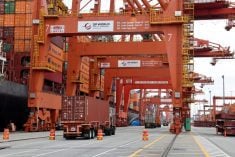WINNIPEG — Canadian pork producers have seen increased demand from China in recent weeks, something which could boost prices in coming months. Despite turbulence in the China’s economy, an industry specialist says exports should be little affected.
Pork prices are sensitive to economic change to an extent, but not as much as non-food markets, says Martin Rice, executive director at the Canadian Pork Council.
Rice says turmoil within the country will likely not affect strong import demand because China has seen a dramatic drop in production.
Read Also

Canadian trade data delayed by U.S. government shutdown
Canadian international trade data for September will be delayed indefinitely due to the ongoing partial shutdown of the United States government, Statistics Canada said Friday, Oct. 24.
“That won’t be changing because that situation is pretty much laid out,” he says.
Due to reductions in China’s pig herds, the country, which has long acted as the world’s biggest pork consumer, will import 45 percent more pork this year.
That’s good news for producers because a global supply glut, especially in the United States, has kept prices low this year, Rice says.
The demand from China will likely have an effect on prices further into the fall and winter.
“Increased exports into China are being noticed particularly in the past several weeks. So we’re now seeing that reflected in somewhat stronger futures prices than we saw a few weeks ago,” Rice says.
He says Canadian producers are eager to provide, but some still need recognition that their production meets China’s requirements.
China bans products with ractopamine, a feed additive to make animals leaner. Many Canadian producers use it but can provide products that are ractopamine-free.
“That’s not something that’s difficult for Canadian suppliers to supply because we do already for several markets provide a product from pigs that are raised not using ractopamine,” Rice says.
But each supplier needs to be formally approved by China, so many are looking into getting additional conditional supply status, he says.
Beyond demand from China, factors moving the market include supplies and prices in other meat markets.
Ample poultry supplies pressure pork prices, but higher beef prices and the relative scarcity of Canadian cattle have helped pork prices.
“Pork and beef are not perfect substitutes, it’s not a case of people just going over and buying pork instead of beef. There’s a pretty strong demand for beef, and some people will pay the higher prices, but nevertheless that has been supportive.”














